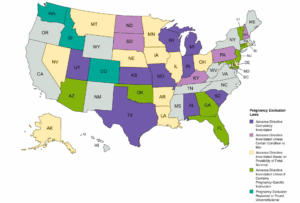By Farah Diaz-Tello, J.D.
What is a Pregnancy Exclusion Law?
Advance directives are legal documents outlining a person’s end-of-life medical treatment wishes. Honoring them is a baseline for ethical healthcare practices. Pregnancy exclusion laws are state-level provisions that invalidate or restrict a pregnant person’s advance directive, making way for unwanted medical interventions with the stated aim of protecting potential fetal life.
Why Pregnancy Exclusion Laws are a Problem
These laws are rooted in the discriminatory idea that people lose the right to make decisions about their bodies during pregnancy. They deny people the ability to express what treatment they want, designate who can make decisions on their behalf, and can even force pregnant individuals to undergo treatments they explicitly refused, transforming deeply personal medical decisions into state-mandated interventions.
Self-determination does not end at the start of a pregnancy, and the state has no place overriding these personal decisions. Every person must have the power to make their own decisions about their body, life, and future.
Pregnancy Exclusion across the US
Progress is possible. Washington removed its pregnancy exclusion in 2025, Colorado removed theirs in 2021, and Idaho’s pregnancy exclusion was held unconstitutional in 2021 in Almerico v. Denney, litigation filed by If/When/How, Compassion and Choices, and Legal Voice. Currently, Kansas’ policy is being challenged by If/When/How and Compassion and Choices in Vernon v. Kobach.

Policy Recommendations
- Repeal Pregnancy Exclusions: The most direct and effective policy solution is the complete repeal of all pregnancy exclusion laws in all states, upholding sex equality, bodily integrity, and medical ethics.
- Support Constitutional Clarity: Policy efforts should ensure that state constitutions and statutory protections for reproductive freedom and bodily autonomy include everyone, regardless of pregnancy status or medical condition.
- Promote Uniform Legislation: States should adopt uniform advance directive legislation that explicitly protects the rights of pregnant individuals. This would reduce confusion, ensure consistent application of patient wishes nationwide, and prevent inequities based on geographic location.
- Educate and Empower Individuals: Governments and healthcare organizations should implement robust public education campaigns to inform individuals about the importance of advance directives, the challenges posed by pregnancy exclusions, and how to best document their wishes, including pregnancy-specific instructions.
- Provide Clear Guidance for Healthcare Providers: State legislatures and medical boards should issue clear, unambiguous guidance to healthcare providers on navigating their ethical duties to pregnant patients, prioritizing the dignity and autonomy of pregnant patients.
→ Read our full brief on pregnancy exclusion laws
Take Action
1. Contact your Legislature: Tell your representatives you support a person’s right to direct their own medical care. No exceptions.
2. Protect Yourself and Your Loved Ones: Create an advance directive explicitly stating your wishes regarding medical care during pregnancy.
3. Support our Legal Work: Your donation directly fuels our legal advocacy efforts and helps us continue to defend anyone facing criminalization for pregnancy, abortion, or birth.
→ Give Now
